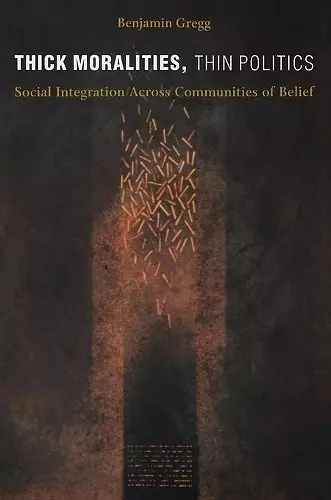Thick Moralities, Thin Politics
Social Integration Across Communities of Belief
Format:Paperback
Publisher:Duke University Press
Published:18th Apr '03
Currently unavailable, and unfortunately no date known when it will be back

Gregg sketches a new moral framework for political theory and public policy
At the center of pluralistic societies like that of the United States is the question of how to make broadly consensual social policy in light of the different moral values held by a heterogeneous population and more. This book develops an approach to deal with conflicting values in the policymaking process.At the center of pluralistic societies like the United States is the question of how to make broadly consensual social policy in light of the different moral values held by a heterogeneous population varying in ethnicity, sexual identity, religion, and political belief. In Thick Moralities, Thin Politics Benjamin Gregg develops a new approach to dealing with conflicting values in the policymaking process. Arguing that public policy suffers when politics are laden with moral doctrines, Gregg contends that "thickly" moral public philosophies cannot be the basis of a successful political process. He offers a "thin" model of political decision-making which brackets moral questions (within the public sphere), deliberately working around them whenever possible—not toward political consensus, but rather the more realistic goal of mutual accommodation.
Thick Moralities, Thin Politics grapples with the work of theorists from both sides of the Atlantic, including Jürgen Habermas, Anthony Giddens, and Niklas Luhmann, as well as George Herbert Mead, Erving Goffman, and Harold Garfinkel. Gregg develops a model of validity for arguments made in the public sphere, for understanding among competing worldviews, and for adjudicating disputes generated by normative differences. He applies his theory of politics to specific issues of contemporary social life, including those relating to the place of women, minorities, and multiculturalism in American and European society today. He also addresses the scientific study of religion, issues of legal interpretation, and the critique of ideology, in each case illuminating how different epistemic systems, as well as competing value systems, can achieve some understanding of one another. Gregg demonstrates, ultimately, that thin politics actually further, rather than reduce, citizens' engagement in the political process.
“With superb insight, Benjamin Gregg melds theory and research in sociology and political science into an approach to communitarianism that in content advances the arguments of Amitai Etzioni and in form rivals the touch of Jeffrey Alexander. Gregg’s concept of ‘enlightened localism’ merits close attention by researchers and theorists alike.”—David Sciulli, author of Corporate Power in Civil Society
”The dividing line between liberalism and communitarianism is steadily eroding, as is evident in a number of recent books dealing with ‘liberal pluralism’ and the like. Thick Moralities, Thin Politics resolutely carries forward this trend. Written from a pragmatist perspective enriched by critical theory, the text articulates the conception of a public sphere composed of several communities with ‘thick moralities’ and held together by a framework of ‘thin’ political rules allowing for diversity and contestation. An important contribution to the debate about democratic multiculturalism.”—Fred R. Dallmayr, University of Notre Dame
ISBN: 9780822330936
Dimensions: unknown
Weight: 367g
256 pages